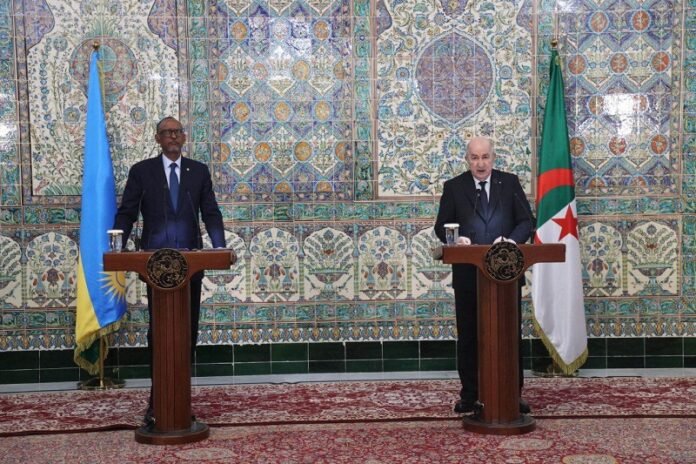Did Tebboune Try to Involve Kagame in the Sahara Issue? An Analysis of the Rwandan President’s Visit to Algeria and Its Diplomatic Implications
In a striking diplomatic scene, Algeria hosted Rwandan President Paul Kagame on an official two-day visit, culminating in the signing of several bilateral agreements. What was supposed to be a simple stop to enhance economic and technical cooperation turned into a platform for a political attempt to instrumentalize the Moroccan Sahara issue—a move that raises questions about diplomatic decorum and the credibility of official positions.
Tebboune Speaks… Kagame Does Not Understand!
At the closing press conference, Algerian President Abdelmadjid Tebboune chose to speak in Arabic without providing simultaneous translation to the Rwandan guest, turning the event into what resembled a “monologue.” Even more striking was Tebboune’s unilateral declaration that Rwanda and Algeria “support the Sahrawi people’s right to self-determination.”
However, this statement found no echo in President Kagame’s subsequent communications. Kagame only mentioned, in a tweet on his official X (formerly Twitter) account, the sectors discussed and agreements signed—covering air transport, agriculture, education, training, investment, and communication—without any reference to the Sahara issue.
President Kagame and President @TebbouneAmadjid led bilateral discussions with their delegations before witnessing the signing of agreements on Air Service, Visa Exemption, Communication, Police, Pharmaceutical Industries, Higher Education, Agriculture, Entrepreneurship,… pic.twitter.com/U4cKVWWde7
— Presidency | Rwanda (@UrugwiroVillage) June 3, 2025
Was Kagame truly part of this position, or did Tebboune attempt once again to export an internal stance at the expense of diplomatic truth?
Kagame’s Silence… An Implicit Rejection?
In diplomatic practice, silence can sometimes speak louder than words. Known for his precision in political language, Kagame neither confirmed nor denied Tebboune’s claim, reflecting an implicit refusal to be involved in a complex regional dispute.
Significantly, Rwanda withdrew its recognition of the so-called “Sahrawi Arab Democratic Republic” years ago as part of a pragmatic African policy shift focused on stability rather than manufactured conflicts. This move was highlighted in international reports such as those by the Institute for Security Studies (ISS) and African Arguments, describing Kigali’s turn toward balanced, non-confrontational foreign policy.
Using “Guests” in Algerian Politics
This is not the first time Algeria has sought to “read intentions” on behalf of its guests. Previous attempts involved attributing pro-Polisario stances to African and Asian countries that never officially made such declarations; some even denied them later. This raises a troubling question: Has Algerian diplomatic rhetoric become a tool for political fabrication rather than responsible dialogue?
A recent 2024 Freedom House report warned about the expansion of “media and political exploitation” within the Algerian system, where regional issues are used to distract from domestic economic and social challenges.
Morocco… Quietly Securing a Strategic Position
Meanwhile, Morocco continues to consolidate its diplomatic standing calmly, relying on broad political, legal, and on-the-ground legitimacy regarding the Sahara issue, supported by UN Security Council resolutions calling for a realistic, consensual political solution. Morocco has not officially responded to Tebboune’s claims but accumulates quiet gains as more countries withdraw recognition from the Polisario Front, and consulates multiply in Laayoune and Dakhla.
Open Questions…
-
Does Tebboune’s behavior reflect diplomatic desperation amid Algeria’s regional isolation after failing to reposition the Sahara issue at the African Union?
-
Why does the Algerian regime insist on attributing stances to leaders who have not expressed them?
-
Has Algeria run out of real allies that it resorts to “speaking on behalf of others”?
Conclusion
President Kagame’s visit to Algeria was not a marginal event, yet it became a lesson in the difference between quiet, action-based diplomacy and impulsive, performative diplomacy. While Kagame chose cooperation and development, Tebboune tried to drag him into an irrelevant political arena—but silence spoke louder than any statement.
In international relations, not all silence is neutrality… sometimes silence is a clear stance against nonsense.


